Business Law: Sources of Law, Business Organizations, and Legal Impact
VerifiedAdded on 2023/01/12
|16
|6102
|28
Report
AI Summary
This comprehensive business law report delves into the core aspects of the UK legal system and its implications for various business organizations. It begins by outlining the different sources of English law, including common law, legislation, and the role of parliament in law-making, along with the distinctions between statutory and common laws. The report then examines the structure of the UK legal system. It explores the impact of company, employment, and contract law on businesses, differentiating between legislation, regulation, and standards, and evaluating the UK's legal system. The report further analyzes different types of business organizations, their formation, management, and funding, assessing their advantages and disadvantages. It also critically evaluates various business organizations and recommends appropriate legal solutions. The report concludes with a comprehensive overview of the key concepts and findings, providing a thorough understanding of business law in the UK.
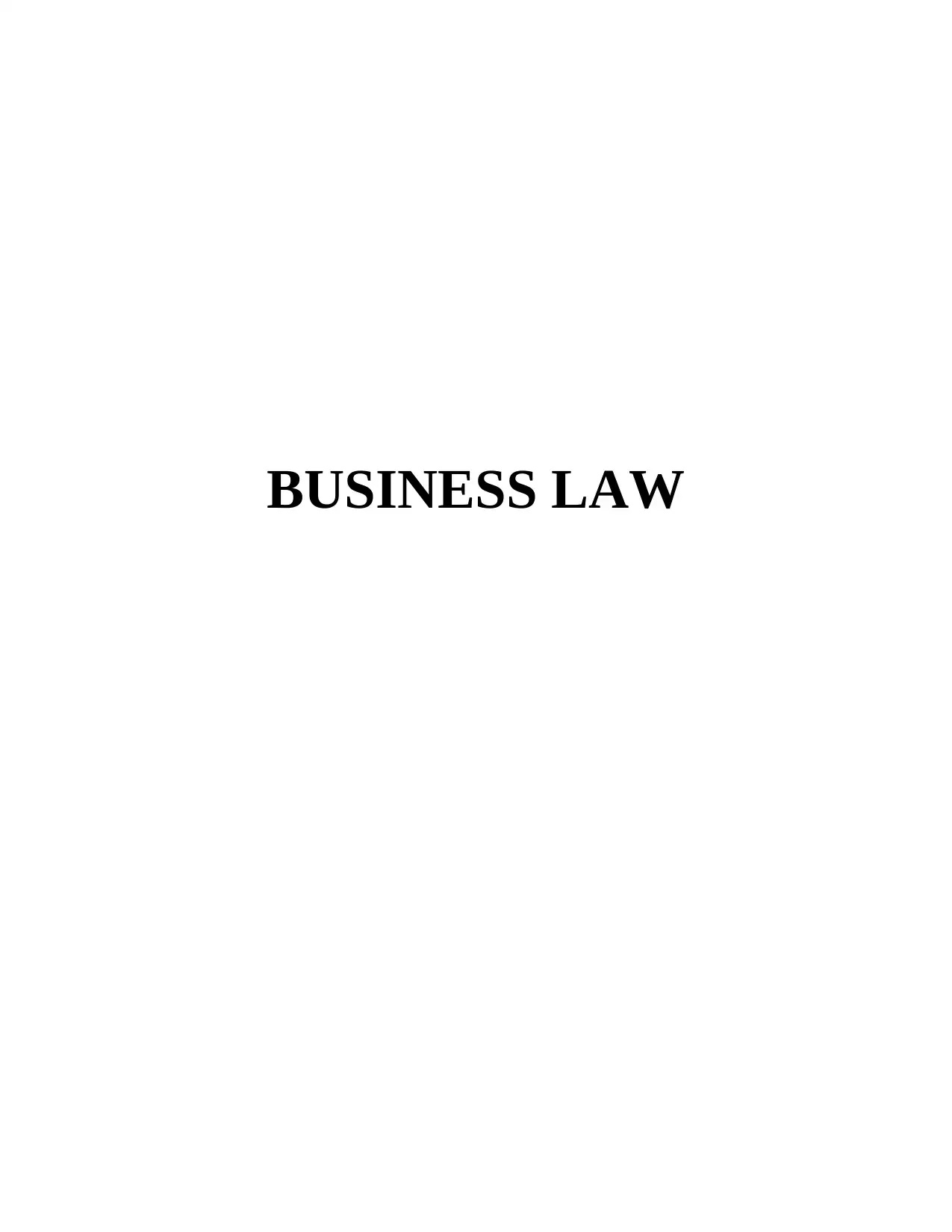
BUSINESS LAW
Paraphrase This Document
Need a fresh take? Get an instant paraphrase of this document with our AI Paraphraser
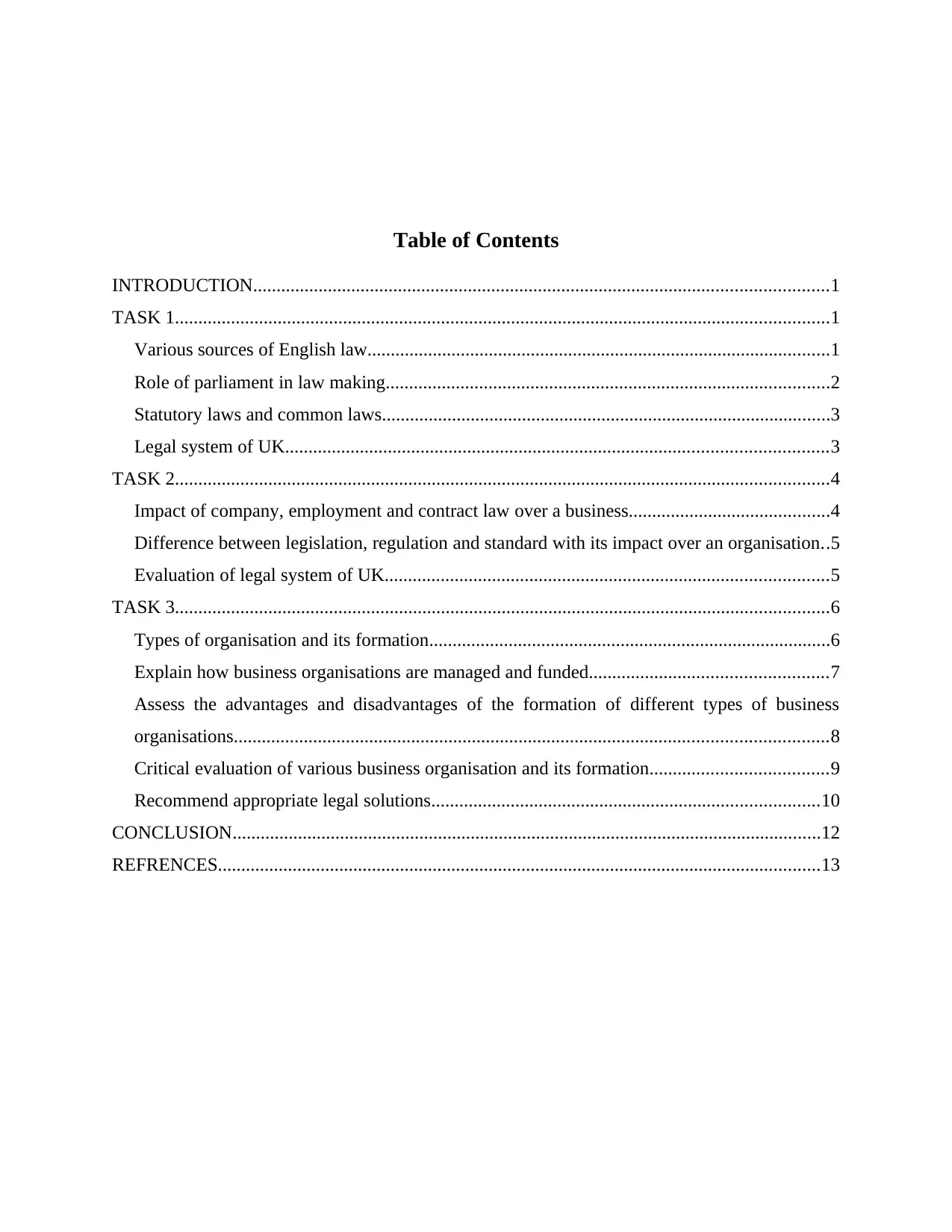
Table of Contents
INTRODUCTION...........................................................................................................................1
TASK 1............................................................................................................................................1
Various sources of English law...................................................................................................1
Role of parliament in law making...............................................................................................2
Statutory laws and common laws................................................................................................3
Legal system of UK....................................................................................................................3
TASK 2............................................................................................................................................4
Impact of company, employment and contract law over a business...........................................4
Difference between legislation, regulation and standard with its impact over an organisation..5
Evaluation of legal system of UK...............................................................................................5
TASK 3............................................................................................................................................6
Types of organisation and its formation......................................................................................6
Explain how business organisations are managed and funded...................................................7
Assess the advantages and disadvantages of the formation of different types of business
organisations...............................................................................................................................8
Critical evaluation of various business organisation and its formation......................................9
Recommend appropriate legal solutions...................................................................................10
CONCLUSION..............................................................................................................................12
REFRENCES.................................................................................................................................13
INTRODUCTION...........................................................................................................................1
TASK 1............................................................................................................................................1
Various sources of English law...................................................................................................1
Role of parliament in law making...............................................................................................2
Statutory laws and common laws................................................................................................3
Legal system of UK....................................................................................................................3
TASK 2............................................................................................................................................4
Impact of company, employment and contract law over a business...........................................4
Difference between legislation, regulation and standard with its impact over an organisation..5
Evaluation of legal system of UK...............................................................................................5
TASK 3............................................................................................................................................6
Types of organisation and its formation......................................................................................6
Explain how business organisations are managed and funded...................................................7
Assess the advantages and disadvantages of the formation of different types of business
organisations...............................................................................................................................8
Critical evaluation of various business organisation and its formation......................................9
Recommend appropriate legal solutions...................................................................................10
CONCLUSION..............................................................................................................................12
REFRENCES.................................................................................................................................13
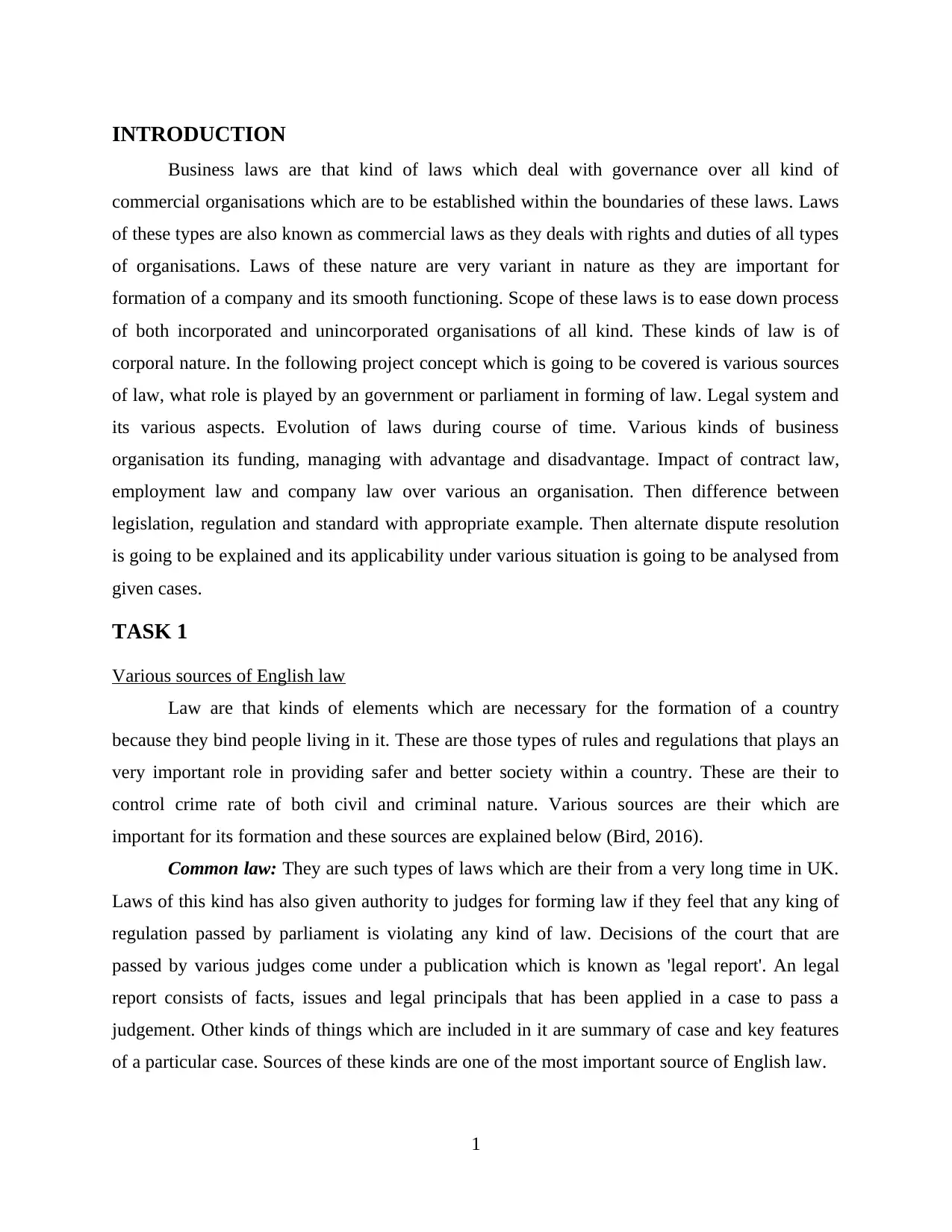
INTRODUCTION
Business laws are that kind of laws which deal with governance over all kind of
commercial organisations which are to be established within the boundaries of these laws. Laws
of these types are also known as commercial laws as they deals with rights and duties of all types
of organisations. Laws of these nature are very variant in nature as they are important for
formation of a company and its smooth functioning. Scope of these laws is to ease down process
of both incorporated and unincorporated organisations of all kind. These kinds of law is of
corporal nature. In the following project concept which is going to be covered is various sources
of law, what role is played by an government or parliament in forming of law. Legal system and
its various aspects. Evolution of laws during course of time. Various kinds of business
organisation its funding, managing with advantage and disadvantage. Impact of contract law,
employment law and company law over various an organisation. Then difference between
legislation, regulation and standard with appropriate example. Then alternate dispute resolution
is going to be explained and its applicability under various situation is going to be analysed from
given cases.
TASK 1
Various sources of English law
Law are that kinds of elements which are necessary for the formation of a country
because they bind people living in it. These are those types of rules and regulations that plays an
very important role in providing safer and better society within a country. These are their to
control crime rate of both civil and criminal nature. Various sources are their which are
important for its formation and these sources are explained below (Bird, 2016).
Common law: They are such types of laws which are their from a very long time in UK.
Laws of this kind has also given authority to judges for forming law if they feel that any king of
regulation passed by parliament is violating any kind of law. Decisions of the court that are
passed by various judges come under a publication which is known as 'legal report'. An legal
report consists of facts, issues and legal principals that has been applied in a case to pass a
judgement. Other kinds of things which are included in it are summary of case and key features
of a particular case. Sources of these kinds are one of the most important source of English law.
1
Business laws are that kind of laws which deal with governance over all kind of
commercial organisations which are to be established within the boundaries of these laws. Laws
of these types are also known as commercial laws as they deals with rights and duties of all types
of organisations. Laws of these nature are very variant in nature as they are important for
formation of a company and its smooth functioning. Scope of these laws is to ease down process
of both incorporated and unincorporated organisations of all kind. These kinds of law is of
corporal nature. In the following project concept which is going to be covered is various sources
of law, what role is played by an government or parliament in forming of law. Legal system and
its various aspects. Evolution of laws during course of time. Various kinds of business
organisation its funding, managing with advantage and disadvantage. Impact of contract law,
employment law and company law over various an organisation. Then difference between
legislation, regulation and standard with appropriate example. Then alternate dispute resolution
is going to be explained and its applicability under various situation is going to be analysed from
given cases.
TASK 1
Various sources of English law
Law are that kinds of elements which are necessary for the formation of a country
because they bind people living in it. These are those types of rules and regulations that plays an
very important role in providing safer and better society within a country. These are their to
control crime rate of both civil and criminal nature. Various sources are their which are
important for its formation and these sources are explained below (Bird, 2016).
Common law: They are such types of laws which are their from a very long time in UK.
Laws of this kind has also given authority to judges for forming law if they feel that any king of
regulation passed by parliament is violating any kind of law. Decisions of the court that are
passed by various judges come under a publication which is known as 'legal report'. An legal
report consists of facts, issues and legal principals that has been applied in a case to pass a
judgement. Other kinds of things which are included in it are summary of case and key features
of a particular case. Sources of these kinds are one of the most important source of English law.
1
⊘ This is a preview!⊘
Do you want full access?
Subscribe today to unlock all pages.

Trusted by 1+ million students worldwide
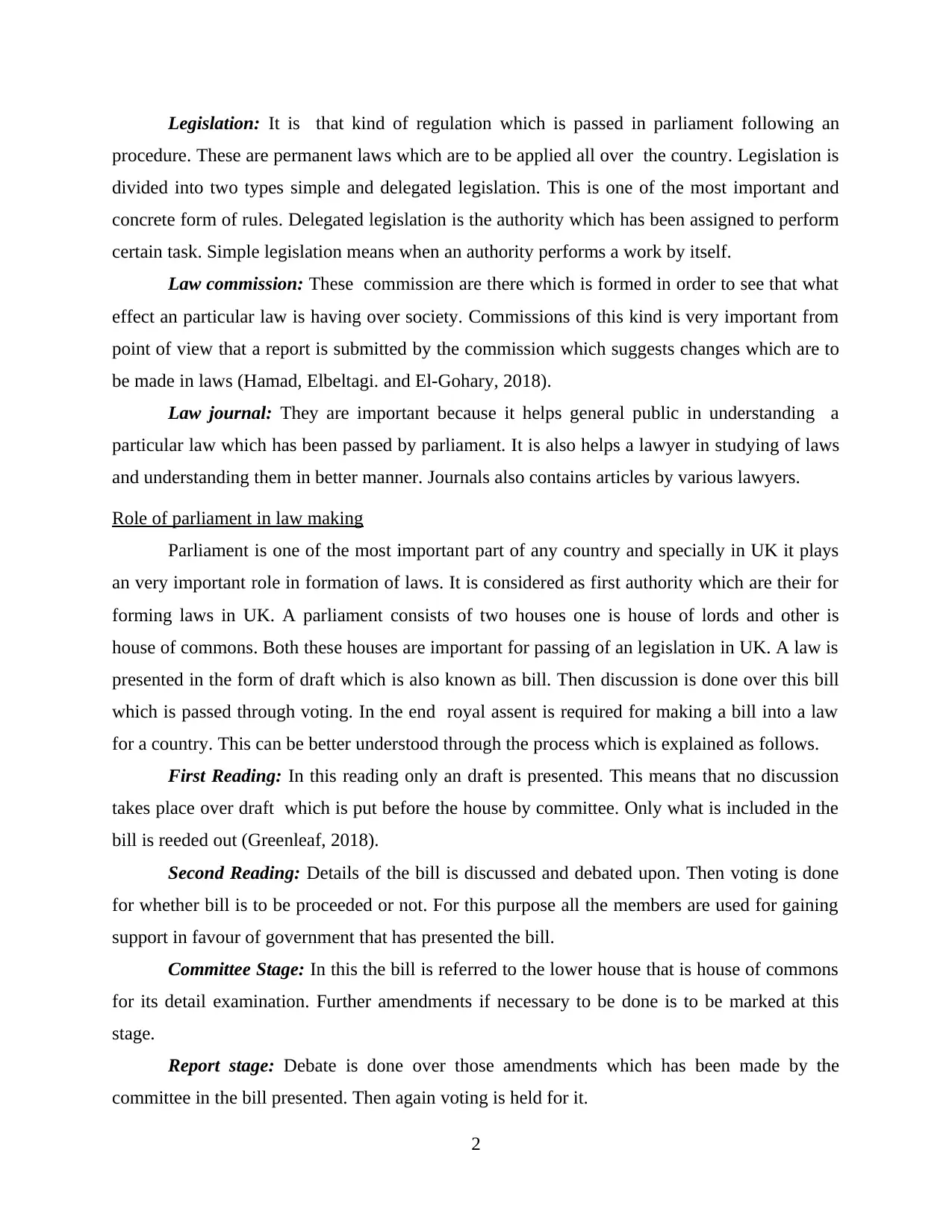
Legislation: It is that kind of regulation which is passed in parliament following an
procedure. These are permanent laws which are to be applied all over the country. Legislation is
divided into two types simple and delegated legislation. This is one of the most important and
concrete form of rules. Delegated legislation is the authority which has been assigned to perform
certain task. Simple legislation means when an authority performs a work by itself.
Law commission: These commission are there which is formed in order to see that what
effect an particular law is having over society. Commissions of this kind is very important from
point of view that a report is submitted by the commission which suggests changes which are to
be made in laws (Hamad, Elbeltagi. and El‐Gohary, 2018).
Law journal: They are important because it helps general public in understanding a
particular law which has been passed by parliament. It is also helps a lawyer in studying of laws
and understanding them in better manner. Journals also contains articles by various lawyers.
Role of parliament in law making
Parliament is one of the most important part of any country and specially in UK it plays
an very important role in formation of laws. It is considered as first authority which are their for
forming laws in UK. A parliament consists of two houses one is house of lords and other is
house of commons. Both these houses are important for passing of an legislation in UK. A law is
presented in the form of draft which is also known as bill. Then discussion is done over this bill
which is passed through voting. In the end royal assent is required for making a bill into a law
for a country. This can be better understood through the process which is explained as follows.
First Reading: In this reading only an draft is presented. This means that no discussion
takes place over draft which is put before the house by committee. Only what is included in the
bill is reeded out (Greenleaf, 2018).
Second Reading: Details of the bill is discussed and debated upon. Then voting is done
for whether bill is to be proceeded or not. For this purpose all the members are used for gaining
support in favour of government that has presented the bill.
Committee Stage: In this the bill is referred to the lower house that is house of commons
for its detail examination. Further amendments if necessary to be done is to be marked at this
stage.
Report stage: Debate is done over those amendments which has been made by the
committee in the bill presented. Then again voting is held for it.
2
procedure. These are permanent laws which are to be applied all over the country. Legislation is
divided into two types simple and delegated legislation. This is one of the most important and
concrete form of rules. Delegated legislation is the authority which has been assigned to perform
certain task. Simple legislation means when an authority performs a work by itself.
Law commission: These commission are there which is formed in order to see that what
effect an particular law is having over society. Commissions of this kind is very important from
point of view that a report is submitted by the commission which suggests changes which are to
be made in laws (Hamad, Elbeltagi. and El‐Gohary, 2018).
Law journal: They are important because it helps general public in understanding a
particular law which has been passed by parliament. It is also helps a lawyer in studying of laws
and understanding them in better manner. Journals also contains articles by various lawyers.
Role of parliament in law making
Parliament is one of the most important part of any country and specially in UK it plays
an very important role in formation of laws. It is considered as first authority which are their for
forming laws in UK. A parliament consists of two houses one is house of lords and other is
house of commons. Both these houses are important for passing of an legislation in UK. A law is
presented in the form of draft which is also known as bill. Then discussion is done over this bill
which is passed through voting. In the end royal assent is required for making a bill into a law
for a country. This can be better understood through the process which is explained as follows.
First Reading: In this reading only an draft is presented. This means that no discussion
takes place over draft which is put before the house by committee. Only what is included in the
bill is reeded out (Greenleaf, 2018).
Second Reading: Details of the bill is discussed and debated upon. Then voting is done
for whether bill is to be proceeded or not. For this purpose all the members are used for gaining
support in favour of government that has presented the bill.
Committee Stage: In this the bill is referred to the lower house that is house of commons
for its detail examination. Further amendments if necessary to be done is to be marked at this
stage.
Report stage: Debate is done over those amendments which has been made by the
committee in the bill presented. Then again voting is held for it.
2
Paraphrase This Document
Need a fresh take? Get an instant paraphrase of this document with our AI Paraphraser
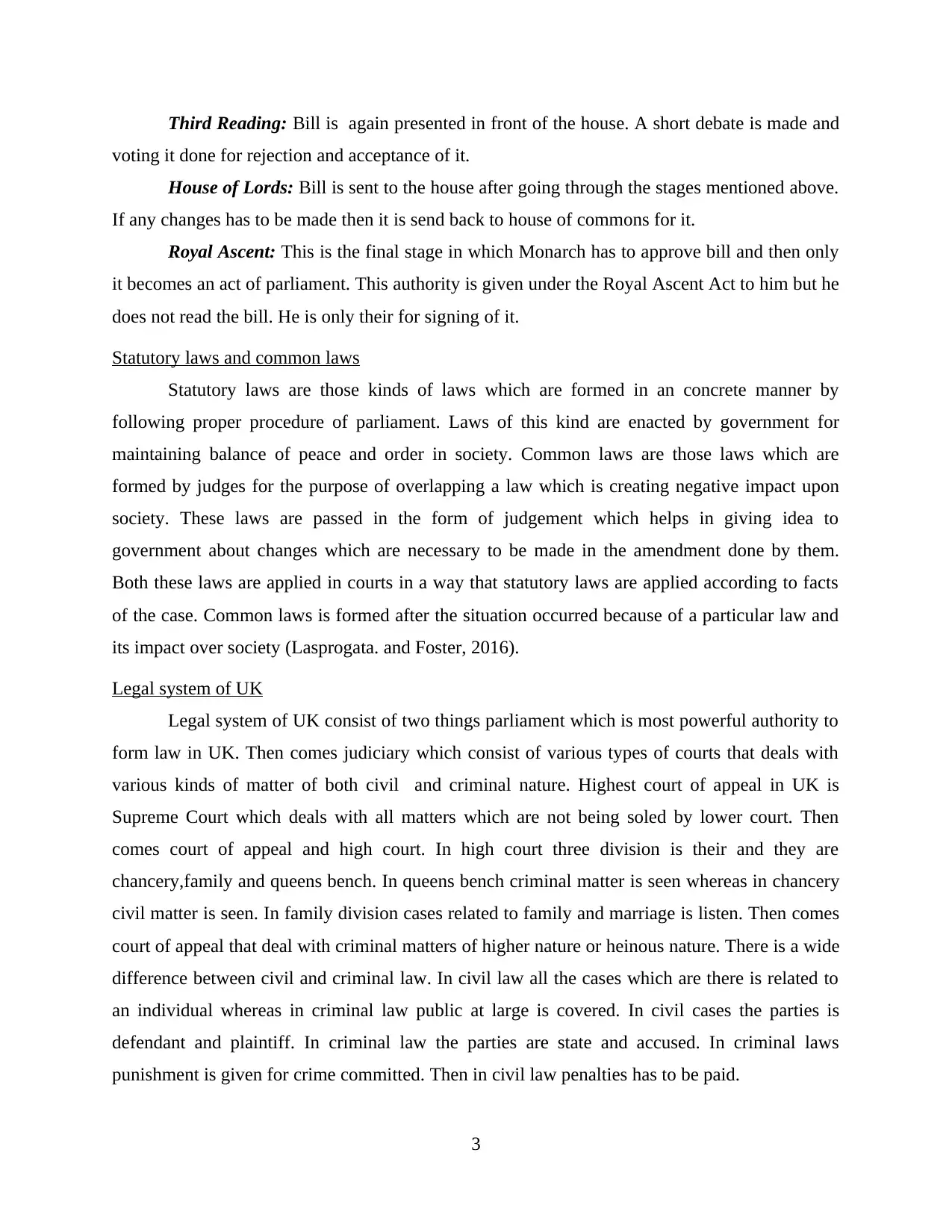
Third Reading: Bill is again presented in front of the house. A short debate is made and
voting it done for rejection and acceptance of it.
House of Lords: Bill is sent to the house after going through the stages mentioned above.
If any changes has to be made then it is send back to house of commons for it.
Royal Ascent: This is the final stage in which Monarch has to approve bill and then only
it becomes an act of parliament. This authority is given under the Royal Ascent Act to him but he
does not read the bill. He is only their for signing of it.
Statutory laws and common laws
Statutory laws are those kinds of laws which are formed in an concrete manner by
following proper procedure of parliament. Laws of this kind are enacted by government for
maintaining balance of peace and order in society. Common laws are those laws which are
formed by judges for the purpose of overlapping a law which is creating negative impact upon
society. These laws are passed in the form of judgement which helps in giving idea to
government about changes which are necessary to be made in the amendment done by them.
Both these laws are applied in courts in a way that statutory laws are applied according to facts
of the case. Common laws is formed after the situation occurred because of a particular law and
its impact over society (Lasprogata. and Foster, 2016).
Legal system of UK
Legal system of UK consist of two things parliament which is most powerful authority to
form law in UK. Then comes judiciary which consist of various types of courts that deals with
various kinds of matter of both civil and criminal nature. Highest court of appeal in UK is
Supreme Court which deals with all matters which are not being soled by lower court. Then
comes court of appeal and high court. In high court three division is their and they are
chancery,family and queens bench. In queens bench criminal matter is seen whereas in chancery
civil matter is seen. In family division cases related to family and marriage is listen. Then comes
court of appeal that deal with criminal matters of higher nature or heinous nature. There is a wide
difference between civil and criminal law. In civil law all the cases which are there is related to
an individual whereas in criminal law public at large is covered. In civil cases the parties is
defendant and plaintiff. In criminal law the parties are state and accused. In criminal laws
punishment is given for crime committed. Then in civil law penalties has to be paid.
3
voting it done for rejection and acceptance of it.
House of Lords: Bill is sent to the house after going through the stages mentioned above.
If any changes has to be made then it is send back to house of commons for it.
Royal Ascent: This is the final stage in which Monarch has to approve bill and then only
it becomes an act of parliament. This authority is given under the Royal Ascent Act to him but he
does not read the bill. He is only their for signing of it.
Statutory laws and common laws
Statutory laws are those kinds of laws which are formed in an concrete manner by
following proper procedure of parliament. Laws of this kind are enacted by government for
maintaining balance of peace and order in society. Common laws are those laws which are
formed by judges for the purpose of overlapping a law which is creating negative impact upon
society. These laws are passed in the form of judgement which helps in giving idea to
government about changes which are necessary to be made in the amendment done by them.
Both these laws are applied in courts in a way that statutory laws are applied according to facts
of the case. Common laws is formed after the situation occurred because of a particular law and
its impact over society (Lasprogata. and Foster, 2016).
Legal system of UK
Legal system of UK consist of two things parliament which is most powerful authority to
form law in UK. Then comes judiciary which consist of various types of courts that deals with
various kinds of matter of both civil and criminal nature. Highest court of appeal in UK is
Supreme Court which deals with all matters which are not being soled by lower court. Then
comes court of appeal and high court. In high court three division is their and they are
chancery,family and queens bench. In queens bench criminal matter is seen whereas in chancery
civil matter is seen. In family division cases related to family and marriage is listen. Then comes
court of appeal that deal with criminal matters of higher nature or heinous nature. There is a wide
difference between civil and criminal law. In civil law all the cases which are there is related to
an individual whereas in criminal law public at large is covered. In civil cases the parties is
defendant and plaintiff. In criminal law the parties are state and accused. In criminal laws
punishment is given for crime committed. Then in civil law penalties has to be paid.
3
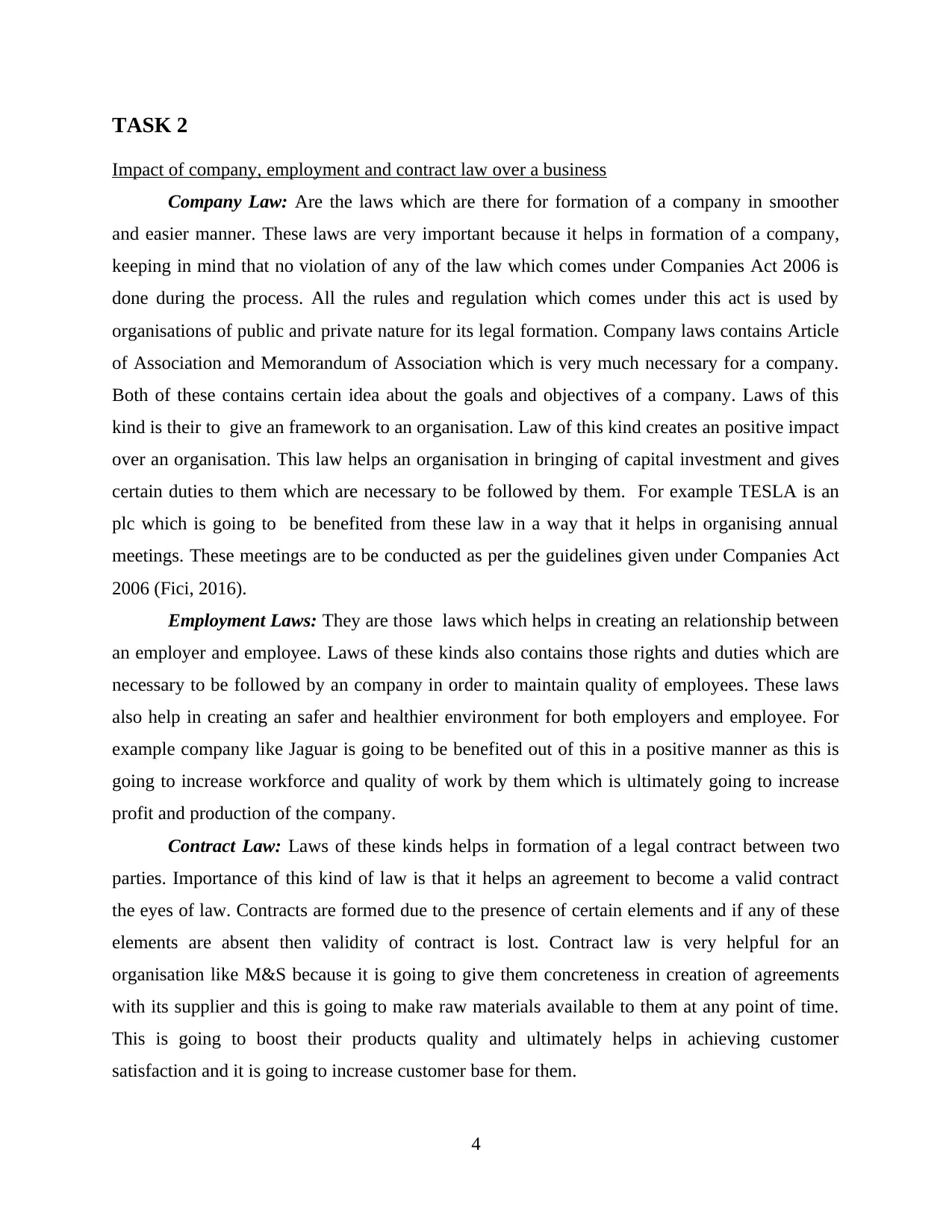
TASK 2
Impact of company, employment and contract law over a business
Company Law: Are the laws which are there for formation of a company in smoother
and easier manner. These laws are very important because it helps in formation of a company,
keeping in mind that no violation of any of the law which comes under Companies Act 2006 is
done during the process. All the rules and regulation which comes under this act is used by
organisations of public and private nature for its legal formation. Company laws contains Article
of Association and Memorandum of Association which is very much necessary for a company.
Both of these contains certain idea about the goals and objectives of a company. Laws of this
kind is their to give an framework to an organisation. Law of this kind creates an positive impact
over an organisation. This law helps an organisation in bringing of capital investment and gives
certain duties to them which are necessary to be followed by them. For example TESLA is an
plc which is going to be benefited from these law in a way that it helps in organising annual
meetings. These meetings are to be conducted as per the guidelines given under Companies Act
2006 (Fici, 2016).
Employment Laws: They are those laws which helps in creating an relationship between
an employer and employee. Laws of these kinds also contains those rights and duties which are
necessary to be followed by an company in order to maintain quality of employees. These laws
also help in creating an safer and healthier environment for both employers and employee. For
example company like Jaguar is going to be benefited out of this in a positive manner as this is
going to increase workforce and quality of work by them which is ultimately going to increase
profit and production of the company.
Contract Law: Laws of these kinds helps in formation of a legal contract between two
parties. Importance of this kind of law is that it helps an agreement to become a valid contract
the eyes of law. Contracts are formed due to the presence of certain elements and if any of these
elements are absent then validity of contract is lost. Contract law is very helpful for an
organisation like M&S because it is going to give them concreteness in creation of agreements
with its supplier and this is going to make raw materials available to them at any point of time.
This is going to boost their products quality and ultimately helps in achieving customer
satisfaction and it is going to increase customer base for them.
4
Impact of company, employment and contract law over a business
Company Law: Are the laws which are there for formation of a company in smoother
and easier manner. These laws are very important because it helps in formation of a company,
keeping in mind that no violation of any of the law which comes under Companies Act 2006 is
done during the process. All the rules and regulation which comes under this act is used by
organisations of public and private nature for its legal formation. Company laws contains Article
of Association and Memorandum of Association which is very much necessary for a company.
Both of these contains certain idea about the goals and objectives of a company. Laws of this
kind is their to give an framework to an organisation. Law of this kind creates an positive impact
over an organisation. This law helps an organisation in bringing of capital investment and gives
certain duties to them which are necessary to be followed by them. For example TESLA is an
plc which is going to be benefited from these law in a way that it helps in organising annual
meetings. These meetings are to be conducted as per the guidelines given under Companies Act
2006 (Fici, 2016).
Employment Laws: They are those laws which helps in creating an relationship between
an employer and employee. Laws of these kinds also contains those rights and duties which are
necessary to be followed by an company in order to maintain quality of employees. These laws
also help in creating an safer and healthier environment for both employers and employee. For
example company like Jaguar is going to be benefited out of this in a positive manner as this is
going to increase workforce and quality of work by them which is ultimately going to increase
profit and production of the company.
Contract Law: Laws of these kinds helps in formation of a legal contract between two
parties. Importance of this kind of law is that it helps an agreement to become a valid contract
the eyes of law. Contracts are formed due to the presence of certain elements and if any of these
elements are absent then validity of contract is lost. Contract law is very helpful for an
organisation like M&S because it is going to give them concreteness in creation of agreements
with its supplier and this is going to make raw materials available to them at any point of time.
This is going to boost their products quality and ultimately helps in achieving customer
satisfaction and it is going to increase customer base for them.
4
⊘ This is a preview!⊘
Do you want full access?
Subscribe today to unlock all pages.

Trusted by 1+ million students worldwide
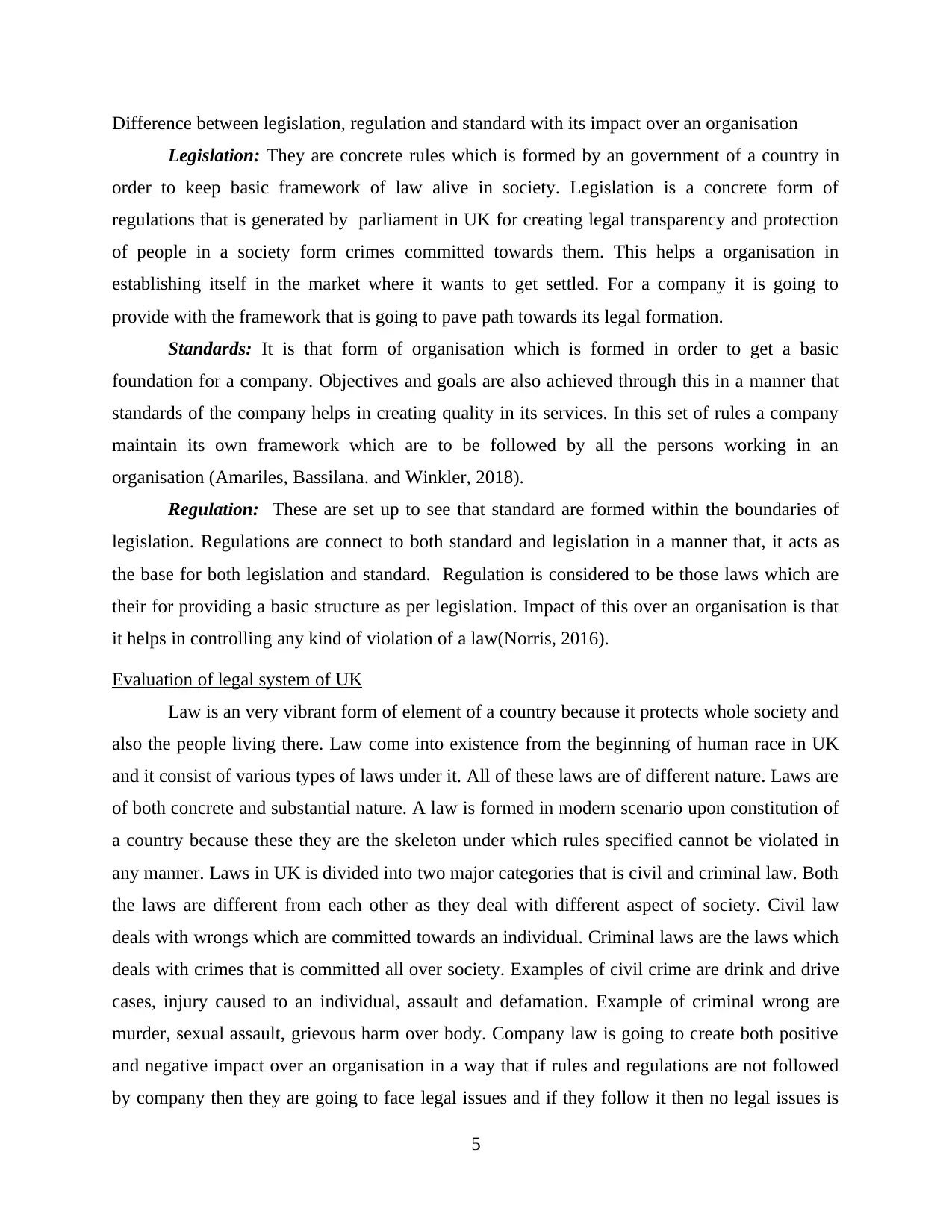
Difference between legislation, regulation and standard with its impact over an organisation
Legislation: They are concrete rules which is formed by an government of a country in
order to keep basic framework of law alive in society. Legislation is a concrete form of
regulations that is generated by parliament in UK for creating legal transparency and protection
of people in a society form crimes committed towards them. This helps a organisation in
establishing itself in the market where it wants to get settled. For a company it is going to
provide with the framework that is going to pave path towards its legal formation.
Standards: It is that form of organisation which is formed in order to get a basic
foundation for a company. Objectives and goals are also achieved through this in a manner that
standards of the company helps in creating quality in its services. In this set of rules a company
maintain its own framework which are to be followed by all the persons working in an
organisation (Amariles, Bassilana. and Winkler, 2018).
Regulation: These are set up to see that standard are formed within the boundaries of
legislation. Regulations are connect to both standard and legislation in a manner that, it acts as
the base for both legislation and standard. Regulation is considered to be those laws which are
their for providing a basic structure as per legislation. Impact of this over an organisation is that
it helps in controlling any kind of violation of a law(Norris, 2016).
Evaluation of legal system of UK
Law is an very vibrant form of element of a country because it protects whole society and
also the people living there. Law come into existence from the beginning of human race in UK
and it consist of various types of laws under it. All of these laws are of different nature. Laws are
of both concrete and substantial nature. A law is formed in modern scenario upon constitution of
a country because these they are the skeleton under which rules specified cannot be violated in
any manner. Laws in UK is divided into two major categories that is civil and criminal law. Both
the laws are different from each other as they deal with different aspect of society. Civil law
deals with wrongs which are committed towards an individual. Criminal laws are the laws which
deals with crimes that is committed all over society. Examples of civil crime are drink and drive
cases, injury caused to an individual, assault and defamation. Example of criminal wrong are
murder, sexual assault, grievous harm over body. Company law is going to create both positive
and negative impact over an organisation in a way that if rules and regulations are not followed
by company then they are going to face legal issues and if they follow it then no legal issues is
5
Legislation: They are concrete rules which is formed by an government of a country in
order to keep basic framework of law alive in society. Legislation is a concrete form of
regulations that is generated by parliament in UK for creating legal transparency and protection
of people in a society form crimes committed towards them. This helps a organisation in
establishing itself in the market where it wants to get settled. For a company it is going to
provide with the framework that is going to pave path towards its legal formation.
Standards: It is that form of organisation which is formed in order to get a basic
foundation for a company. Objectives and goals are also achieved through this in a manner that
standards of the company helps in creating quality in its services. In this set of rules a company
maintain its own framework which are to be followed by all the persons working in an
organisation (Amariles, Bassilana. and Winkler, 2018).
Regulation: These are set up to see that standard are formed within the boundaries of
legislation. Regulations are connect to both standard and legislation in a manner that, it acts as
the base for both legislation and standard. Regulation is considered to be those laws which are
their for providing a basic structure as per legislation. Impact of this over an organisation is that
it helps in controlling any kind of violation of a law(Norris, 2016).
Evaluation of legal system of UK
Law is an very vibrant form of element of a country because it protects whole society and
also the people living there. Law come into existence from the beginning of human race in UK
and it consist of various types of laws under it. All of these laws are of different nature. Laws are
of both concrete and substantial nature. A law is formed in modern scenario upon constitution of
a country because these they are the skeleton under which rules specified cannot be violated in
any manner. Laws in UK is divided into two major categories that is civil and criminal law. Both
the laws are different from each other as they deal with different aspect of society. Civil law
deals with wrongs which are committed towards an individual. Criminal laws are the laws which
deals with crimes that is committed all over society. Examples of civil crime are drink and drive
cases, injury caused to an individual, assault and defamation. Example of criminal wrong are
murder, sexual assault, grievous harm over body. Company law is going to create both positive
and negative impact over an organisation in a way that if rules and regulations are not followed
by company then they are going to face legal issues and if they follow it then no legal issues is
5
Paraphrase This Document
Need a fresh take? Get an instant paraphrase of this document with our AI Paraphraser
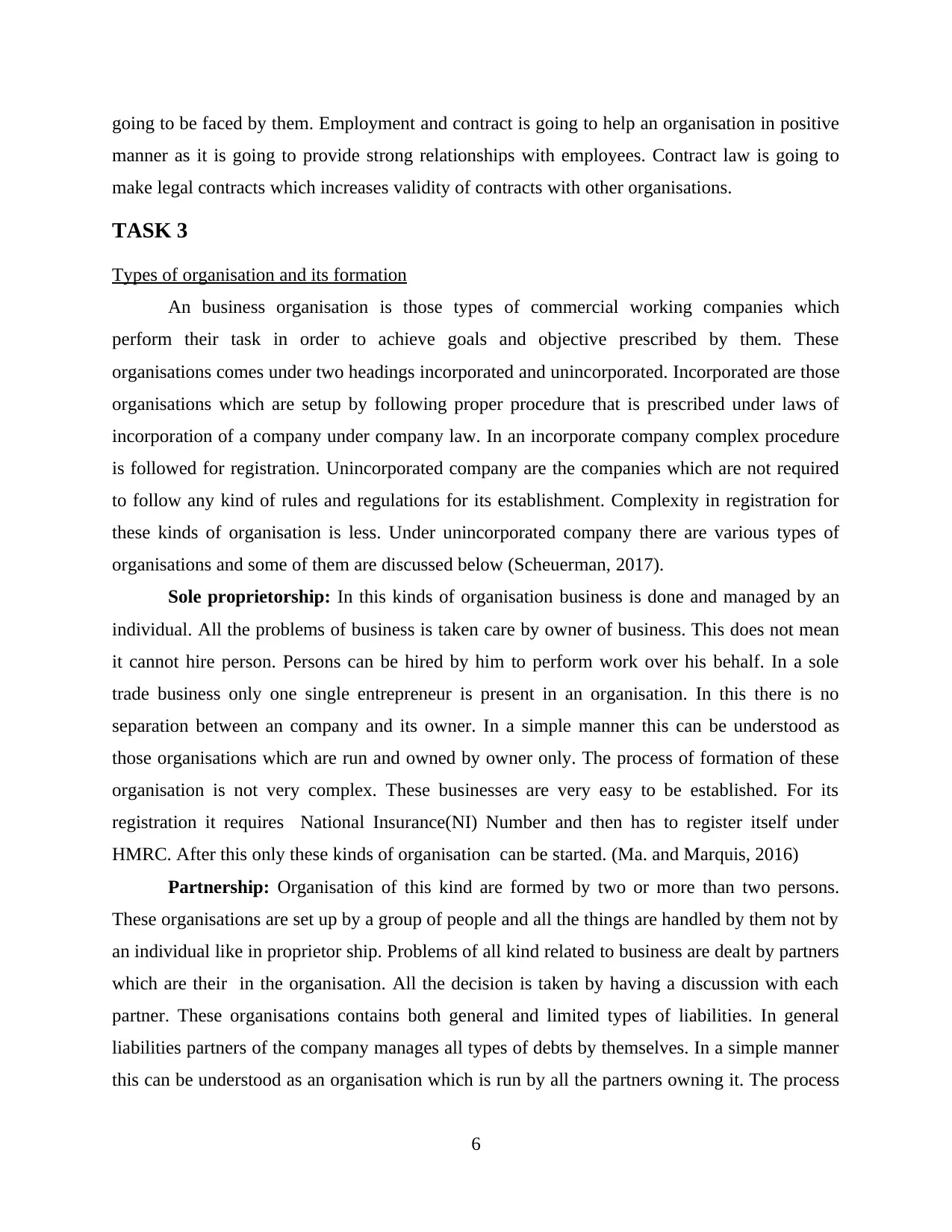
going to be faced by them. Employment and contract is going to help an organisation in positive
manner as it is going to provide strong relationships with employees. Contract law is going to
make legal contracts which increases validity of contracts with other organisations.
TASK 3
Types of organisation and its formation
An business organisation is those types of commercial working companies which
perform their task in order to achieve goals and objective prescribed by them. These
organisations comes under two headings incorporated and unincorporated. Incorporated are those
organisations which are setup by following proper procedure that is prescribed under laws of
incorporation of a company under company law. In an incorporate company complex procedure
is followed for registration. Unincorporated company are the companies which are not required
to follow any kind of rules and regulations for its establishment. Complexity in registration for
these kinds of organisation is less. Under unincorporated company there are various types of
organisations and some of them are discussed below (Scheuerman, 2017).
Sole proprietorship: In this kinds of organisation business is done and managed by an
individual. All the problems of business is taken care by owner of business. This does not mean
it cannot hire person. Persons can be hired by him to perform work over his behalf. In a sole
trade business only one single entrepreneur is present in an organisation. In this there is no
separation between an company and its owner. In a simple manner this can be understood as
those organisations which are run and owned by owner only. The process of formation of these
organisation is not very complex. These businesses are very easy to be established. For its
registration it requires National Insurance(NI) Number and then has to register itself under
HMRC. After this only these kinds of organisation can be started. (Ma. and Marquis, 2016)
Partnership: Organisation of this kind are formed by two or more than two persons.
These organisations are set up by a group of people and all the things are handled by them not by
an individual like in proprietor ship. Problems of all kind related to business are dealt by partners
which are their in the organisation. All the decision is taken by having a discussion with each
partner. These organisations contains both general and limited types of liabilities. In general
liabilities partners of the company manages all types of debts by themselves. In a simple manner
this can be understood as an organisation which is run by all the partners owning it. The process
6
manner as it is going to provide strong relationships with employees. Contract law is going to
make legal contracts which increases validity of contracts with other organisations.
TASK 3
Types of organisation and its formation
An business organisation is those types of commercial working companies which
perform their task in order to achieve goals and objective prescribed by them. These
organisations comes under two headings incorporated and unincorporated. Incorporated are those
organisations which are setup by following proper procedure that is prescribed under laws of
incorporation of a company under company law. In an incorporate company complex procedure
is followed for registration. Unincorporated company are the companies which are not required
to follow any kind of rules and regulations for its establishment. Complexity in registration for
these kinds of organisation is less. Under unincorporated company there are various types of
organisations and some of them are discussed below (Scheuerman, 2017).
Sole proprietorship: In this kinds of organisation business is done and managed by an
individual. All the problems of business is taken care by owner of business. This does not mean
it cannot hire person. Persons can be hired by him to perform work over his behalf. In a sole
trade business only one single entrepreneur is present in an organisation. In this there is no
separation between an company and its owner. In a simple manner this can be understood as
those organisations which are run and owned by owner only. The process of formation of these
organisation is not very complex. These businesses are very easy to be established. For its
registration it requires National Insurance(NI) Number and then has to register itself under
HMRC. After this only these kinds of organisation can be started. (Ma. and Marquis, 2016)
Partnership: Organisation of this kind are formed by two or more than two persons.
These organisations are set up by a group of people and all the things are handled by them not by
an individual like in proprietor ship. Problems of all kind related to business are dealt by partners
which are their in the organisation. All the decision is taken by having a discussion with each
partner. These organisations contains both general and limited types of liabilities. In general
liabilities partners of the company manages all types of debts by themselves. In a simple manner
this can be understood as an organisation which is run by all the partners owning it. The process
6
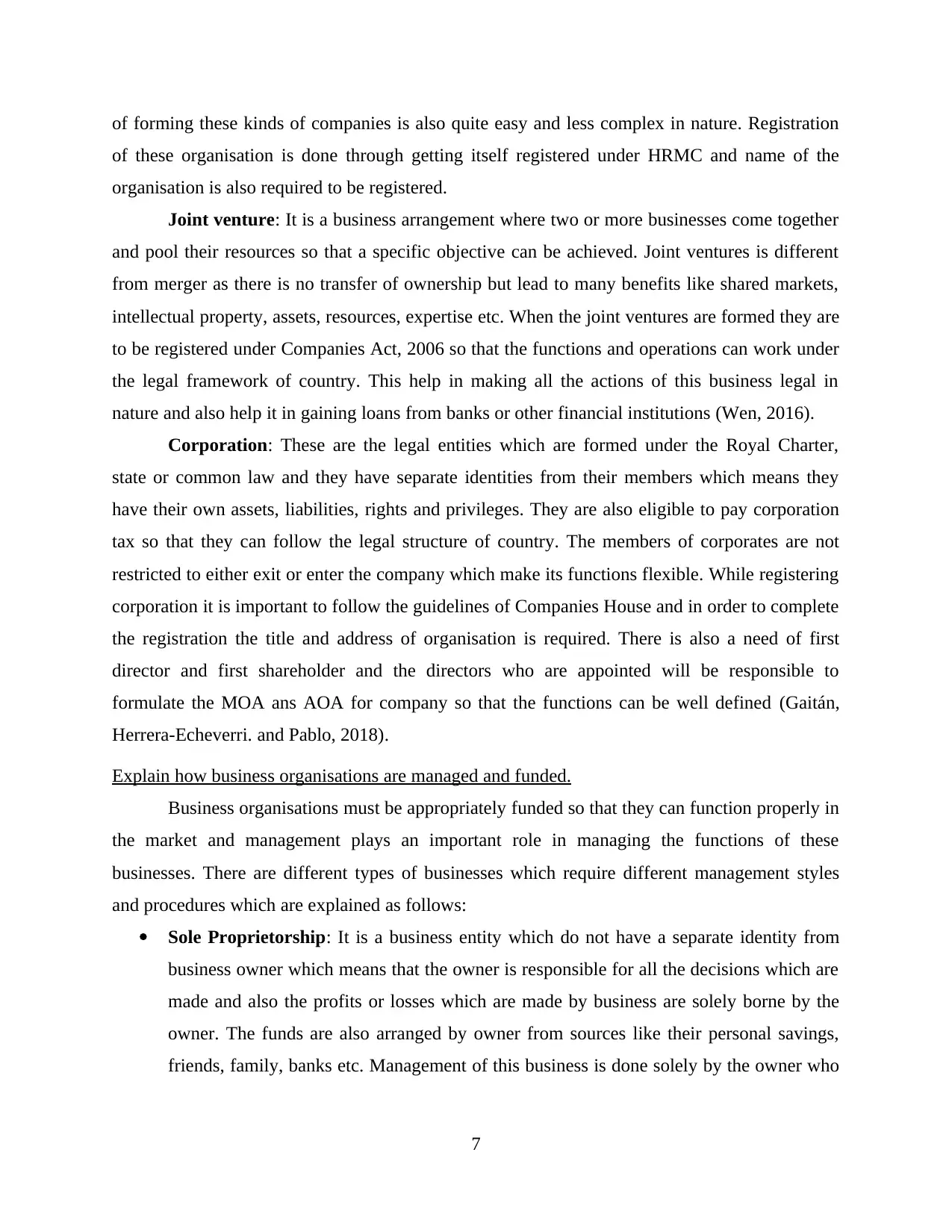
of forming these kinds of companies is also quite easy and less complex in nature. Registration
of these organisation is done through getting itself registered under HRMC and name of the
organisation is also required to be registered.
Joint venture: It is a business arrangement where two or more businesses come together
and pool their resources so that a specific objective can be achieved. Joint ventures is different
from merger as there is no transfer of ownership but lead to many benefits like shared markets,
intellectual property, assets, resources, expertise etc. When the joint ventures are formed they are
to be registered under Companies Act, 2006 so that the functions and operations can work under
the legal framework of country. This help in making all the actions of this business legal in
nature and also help it in gaining loans from banks or other financial institutions (Wen, 2016).
Corporation: These are the legal entities which are formed under the Royal Charter,
state or common law and they have separate identities from their members which means they
have their own assets, liabilities, rights and privileges. They are also eligible to pay corporation
tax so that they can follow the legal structure of country. The members of corporates are not
restricted to either exit or enter the company which make its functions flexible. While registering
corporation it is important to follow the guidelines of Companies House and in order to complete
the registration the title and address of organisation is required. There is also a need of first
director and first shareholder and the directors who are appointed will be responsible to
formulate the MOA ans AOA for company so that the functions can be well defined (Gaitán,
Herrera-Echeverri. and Pablo, 2018).
Explain how business organisations are managed and funded.
Business organisations must be appropriately funded so that they can function properly in
the market and management plays an important role in managing the functions of these
businesses. There are different types of businesses which require different management styles
and procedures which are explained as follows:
Sole Proprietorship: It is a business entity which do not have a separate identity from
business owner which means that the owner is responsible for all the decisions which are
made and also the profits or losses which are made by business are solely borne by the
owner. The funds are also arranged by owner from sources like their personal savings,
friends, family, banks etc. Management of this business is done solely by the owner who
7
of these organisation is done through getting itself registered under HRMC and name of the
organisation is also required to be registered.
Joint venture: It is a business arrangement where two or more businesses come together
and pool their resources so that a specific objective can be achieved. Joint ventures is different
from merger as there is no transfer of ownership but lead to many benefits like shared markets,
intellectual property, assets, resources, expertise etc. When the joint ventures are formed they are
to be registered under Companies Act, 2006 so that the functions and operations can work under
the legal framework of country. This help in making all the actions of this business legal in
nature and also help it in gaining loans from banks or other financial institutions (Wen, 2016).
Corporation: These are the legal entities which are formed under the Royal Charter,
state or common law and they have separate identities from their members which means they
have their own assets, liabilities, rights and privileges. They are also eligible to pay corporation
tax so that they can follow the legal structure of country. The members of corporates are not
restricted to either exit or enter the company which make its functions flexible. While registering
corporation it is important to follow the guidelines of Companies House and in order to complete
the registration the title and address of organisation is required. There is also a need of first
director and first shareholder and the directors who are appointed will be responsible to
formulate the MOA ans AOA for company so that the functions can be well defined (Gaitán,
Herrera-Echeverri. and Pablo, 2018).
Explain how business organisations are managed and funded.
Business organisations must be appropriately funded so that they can function properly in
the market and management plays an important role in managing the functions of these
businesses. There are different types of businesses which require different management styles
and procedures which are explained as follows:
Sole Proprietorship: It is a business entity which do not have a separate identity from
business owner which means that the owner is responsible for all the decisions which are
made and also the profits or losses which are made by business are solely borne by the
owner. The funds are also arranged by owner from sources like their personal savings,
friends, family, banks etc. Management of this business is done solely by the owner who
7
⊘ This is a preview!⊘
Do you want full access?
Subscribe today to unlock all pages.

Trusted by 1+ million students worldwide
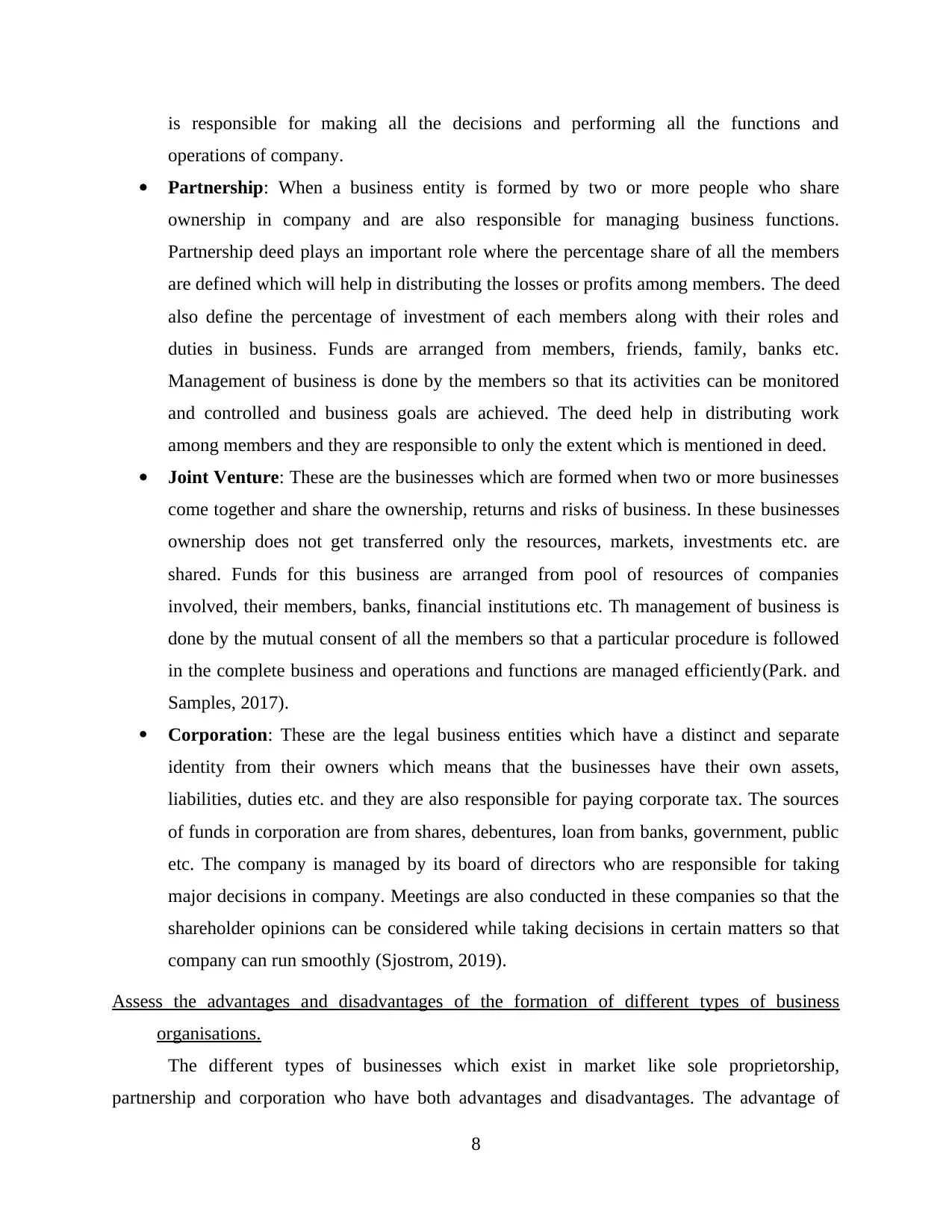
is responsible for making all the decisions and performing all the functions and
operations of company.
Partnership: When a business entity is formed by two or more people who share
ownership in company and are also responsible for managing business functions.
Partnership deed plays an important role where the percentage share of all the members
are defined which will help in distributing the losses or profits among members. The deed
also define the percentage of investment of each members along with their roles and
duties in business. Funds are arranged from members, friends, family, banks etc.
Management of business is done by the members so that its activities can be monitored
and controlled and business goals are achieved. The deed help in distributing work
among members and they are responsible to only the extent which is mentioned in deed.
Joint Venture: These are the businesses which are formed when two or more businesses
come together and share the ownership, returns and risks of business. In these businesses
ownership does not get transferred only the resources, markets, investments etc. are
shared. Funds for this business are arranged from pool of resources of companies
involved, their members, banks, financial institutions etc. Th management of business is
done by the mutual consent of all the members so that a particular procedure is followed
in the complete business and operations and functions are managed efficiently(Park. and
Samples, 2017).
Corporation: These are the legal business entities which have a distinct and separate
identity from their owners which means that the businesses have their own assets,
liabilities, duties etc. and they are also responsible for paying corporate tax. The sources
of funds in corporation are from shares, debentures, loan from banks, government, public
etc. The company is managed by its board of directors who are responsible for taking
major decisions in company. Meetings are also conducted in these companies so that the
shareholder opinions can be considered while taking decisions in certain matters so that
company can run smoothly (Sjostrom, 2019).
Assess the advantages and disadvantages of the formation of different types of business
organisations.
The different types of businesses which exist in market like sole proprietorship,
partnership and corporation who have both advantages and disadvantages. The advantage of
8
operations of company.
Partnership: When a business entity is formed by two or more people who share
ownership in company and are also responsible for managing business functions.
Partnership deed plays an important role where the percentage share of all the members
are defined which will help in distributing the losses or profits among members. The deed
also define the percentage of investment of each members along with their roles and
duties in business. Funds are arranged from members, friends, family, banks etc.
Management of business is done by the members so that its activities can be monitored
and controlled and business goals are achieved. The deed help in distributing work
among members and they are responsible to only the extent which is mentioned in deed.
Joint Venture: These are the businesses which are formed when two or more businesses
come together and share the ownership, returns and risks of business. In these businesses
ownership does not get transferred only the resources, markets, investments etc. are
shared. Funds for this business are arranged from pool of resources of companies
involved, their members, banks, financial institutions etc. Th management of business is
done by the mutual consent of all the members so that a particular procedure is followed
in the complete business and operations and functions are managed efficiently(Park. and
Samples, 2017).
Corporation: These are the legal business entities which have a distinct and separate
identity from their owners which means that the businesses have their own assets,
liabilities, duties etc. and they are also responsible for paying corporate tax. The sources
of funds in corporation are from shares, debentures, loan from banks, government, public
etc. The company is managed by its board of directors who are responsible for taking
major decisions in company. Meetings are also conducted in these companies so that the
shareholder opinions can be considered while taking decisions in certain matters so that
company can run smoothly (Sjostrom, 2019).
Assess the advantages and disadvantages of the formation of different types of business
organisations.
The different types of businesses which exist in market like sole proprietorship,
partnership and corporation who have both advantages and disadvantages. The advantage of
8
Paraphrase This Document
Need a fresh take? Get an instant paraphrase of this document with our AI Paraphraser
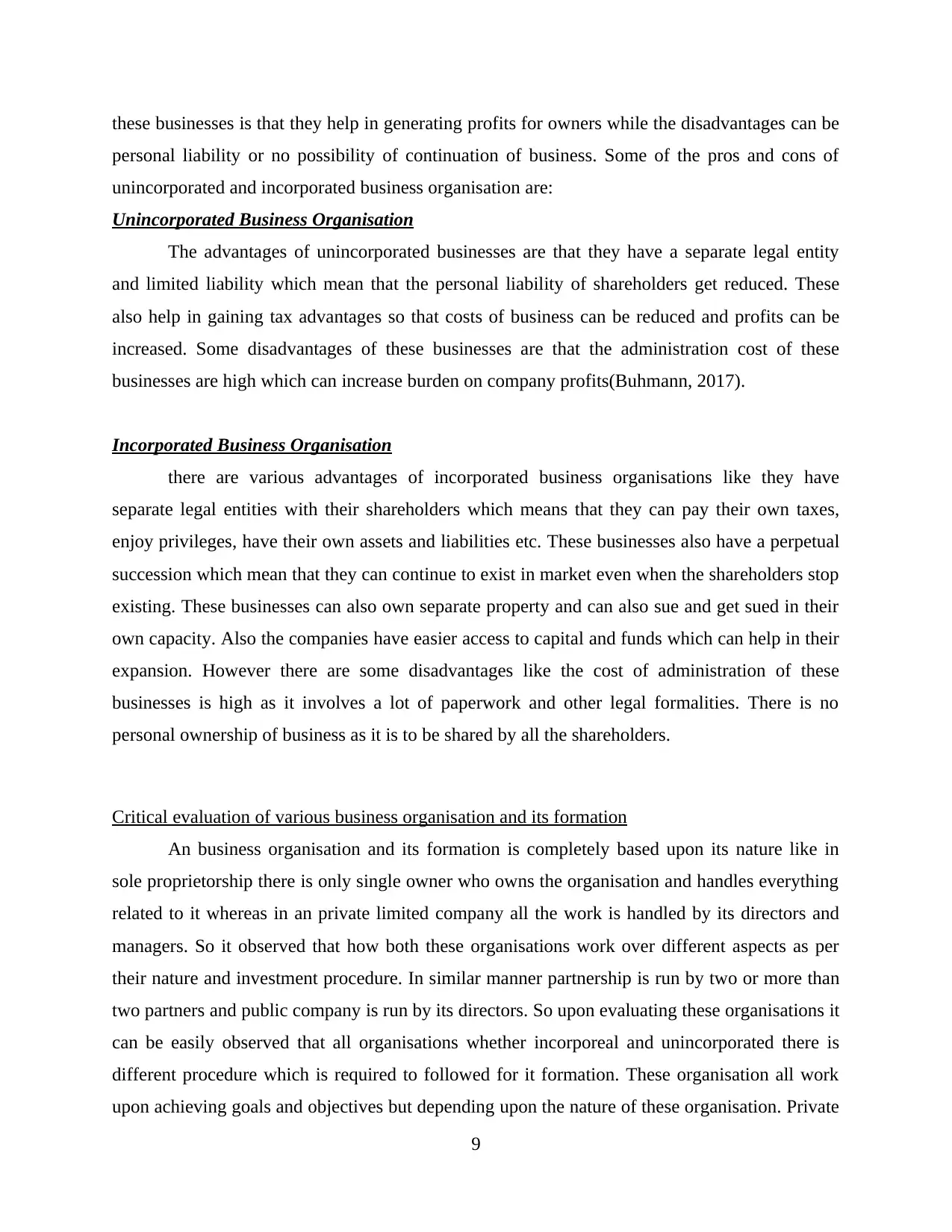
these businesses is that they help in generating profits for owners while the disadvantages can be
personal liability or no possibility of continuation of business. Some of the pros and cons of
unincorporated and incorporated business organisation are:
Unincorporated Business Organisation
The advantages of unincorporated businesses are that they have a separate legal entity
and limited liability which mean that the personal liability of shareholders get reduced. These
also help in gaining tax advantages so that costs of business can be reduced and profits can be
increased. Some disadvantages of these businesses are that the administration cost of these
businesses are high which can increase burden on company profits(Buhmann, 2017).
Incorporated Business Organisation
there are various advantages of incorporated business organisations like they have
separate legal entities with their shareholders which means that they can pay their own taxes,
enjoy privileges, have their own assets and liabilities etc. These businesses also have a perpetual
succession which mean that they can continue to exist in market even when the shareholders stop
existing. These businesses can also own separate property and can also sue and get sued in their
own capacity. Also the companies have easier access to capital and funds which can help in their
expansion. However there are some disadvantages like the cost of administration of these
businesses is high as it involves a lot of paperwork and other legal formalities. There is no
personal ownership of business as it is to be shared by all the shareholders.
Critical evaluation of various business organisation and its formation
An business organisation and its formation is completely based upon its nature like in
sole proprietorship there is only single owner who owns the organisation and handles everything
related to it whereas in an private limited company all the work is handled by its directors and
managers. So it observed that how both these organisations work over different aspects as per
their nature and investment procedure. In similar manner partnership is run by two or more than
two partners and public company is run by its directors. So upon evaluating these organisations it
can be easily observed that all organisations whether incorporeal and unincorporated there is
different procedure which is required to followed for it formation. These organisation all work
upon achieving goals and objectives but depending upon the nature of these organisation. Private
9
personal liability or no possibility of continuation of business. Some of the pros and cons of
unincorporated and incorporated business organisation are:
Unincorporated Business Organisation
The advantages of unincorporated businesses are that they have a separate legal entity
and limited liability which mean that the personal liability of shareholders get reduced. These
also help in gaining tax advantages so that costs of business can be reduced and profits can be
increased. Some disadvantages of these businesses are that the administration cost of these
businesses are high which can increase burden on company profits(Buhmann, 2017).
Incorporated Business Organisation
there are various advantages of incorporated business organisations like they have
separate legal entities with their shareholders which means that they can pay their own taxes,
enjoy privileges, have their own assets and liabilities etc. These businesses also have a perpetual
succession which mean that they can continue to exist in market even when the shareholders stop
existing. These businesses can also own separate property and can also sue and get sued in their
own capacity. Also the companies have easier access to capital and funds which can help in their
expansion. However there are some disadvantages like the cost of administration of these
businesses is high as it involves a lot of paperwork and other legal formalities. There is no
personal ownership of business as it is to be shared by all the shareholders.
Critical evaluation of various business organisation and its formation
An business organisation and its formation is completely based upon its nature like in
sole proprietorship there is only single owner who owns the organisation and handles everything
related to it whereas in an private limited company all the work is handled by its directors and
managers. So it observed that how both these organisations work over different aspects as per
their nature and investment procedure. In similar manner partnership is run by two or more than
two partners and public company is run by its directors. So upon evaluating these organisations it
can be easily observed that all organisations whether incorporeal and unincorporated there is
different procedure which is required to followed for it formation. These organisation all work
upon achieving goals and objectives but depending upon the nature of these organisation. Private
9
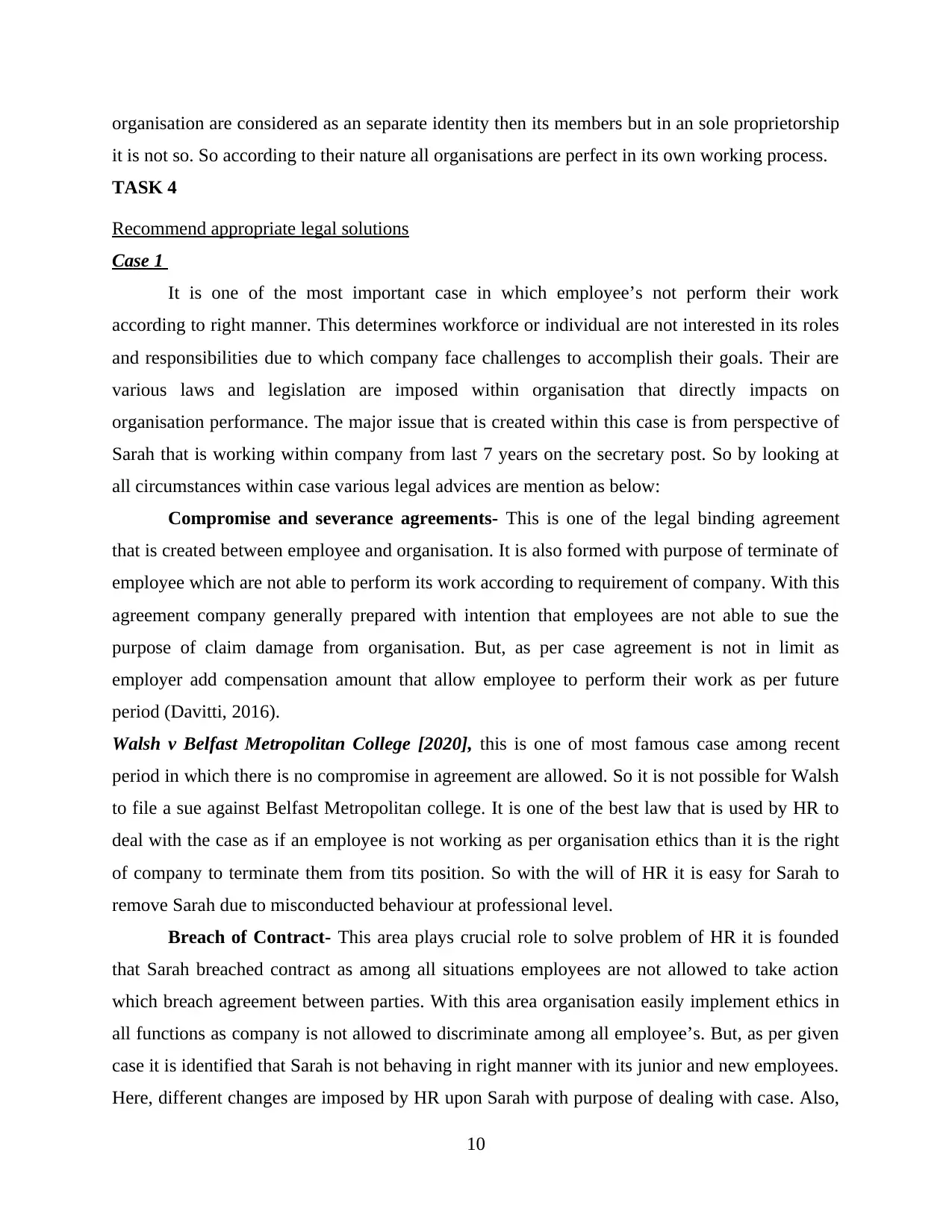
organisation are considered as an separate identity then its members but in an sole proprietorship
it is not so. So according to their nature all organisations are perfect in its own working process.
TASK 4
Recommend appropriate legal solutions
Case 1
It is one of the most important case in which employee’s not perform their work
according to right manner. This determines workforce or individual are not interested in its roles
and responsibilities due to which company face challenges to accomplish their goals. Their are
various laws and legislation are imposed within organisation that directly impacts on
organisation performance. The major issue that is created within this case is from perspective of
Sarah that is working within company from last 7 years on the secretary post. So by looking at
all circumstances within case various legal advices are mention as below:
Compromise and severance agreements- This is one of the legal binding agreement
that is created between employee and organisation. It is also formed with purpose of terminate of
employee which are not able to perform its work according to requirement of company. With this
agreement company generally prepared with intention that employees are not able to sue the
purpose of claim damage from organisation. But, as per case agreement is not in limit as
employer add compensation amount that allow employee to perform their work as per future
period (Davitti, 2016).
Walsh v Belfast Metropolitan College [2020], this is one of most famous case among recent
period in which there is no compromise in agreement are allowed. So it is not possible for Walsh
to file a sue against Belfast Metropolitan college. It is one of the best law that is used by HR to
deal with the case as if an employee is not working as per organisation ethics than it is the right
of company to terminate them from tits position. So with the will of HR it is easy for Sarah to
remove Sarah due to misconducted behaviour at professional level.
Breach of Contract- This area plays crucial role to solve problem of HR it is founded
that Sarah breached contract as among all situations employees are not allowed to take action
which breach agreement between parties. With this area organisation easily implement ethics in
all functions as company is not allowed to discriminate among all employee’s. But, as per given
case it is identified that Sarah is not behaving in right manner with its junior and new employees.
Here, different changes are imposed by HR upon Sarah with purpose of dealing with case. Also,
10
it is not so. So according to their nature all organisations are perfect in its own working process.
TASK 4
Recommend appropriate legal solutions
Case 1
It is one of the most important case in which employee’s not perform their work
according to right manner. This determines workforce or individual are not interested in its roles
and responsibilities due to which company face challenges to accomplish their goals. Their are
various laws and legislation are imposed within organisation that directly impacts on
organisation performance. The major issue that is created within this case is from perspective of
Sarah that is working within company from last 7 years on the secretary post. So by looking at
all circumstances within case various legal advices are mention as below:
Compromise and severance agreements- This is one of the legal binding agreement
that is created between employee and organisation. It is also formed with purpose of terminate of
employee which are not able to perform its work according to requirement of company. With this
agreement company generally prepared with intention that employees are not able to sue the
purpose of claim damage from organisation. But, as per case agreement is not in limit as
employer add compensation amount that allow employee to perform their work as per future
period (Davitti, 2016).
Walsh v Belfast Metropolitan College [2020], this is one of most famous case among recent
period in which there is no compromise in agreement are allowed. So it is not possible for Walsh
to file a sue against Belfast Metropolitan college. It is one of the best law that is used by HR to
deal with the case as if an employee is not working as per organisation ethics than it is the right
of company to terminate them from tits position. So with the will of HR it is easy for Sarah to
remove Sarah due to misconducted behaviour at professional level.
Breach of Contract- This area plays crucial role to solve problem of HR it is founded
that Sarah breached contract as among all situations employees are not allowed to take action
which breach agreement between parties. With this area organisation easily implement ethics in
all functions as company is not allowed to discriminate among all employee’s. But, as per given
case it is identified that Sarah is not behaving in right manner with its junior and new employees.
Here, different changes are imposed by HR upon Sarah with purpose of dealing with case. Also,
10
⊘ This is a preview!⊘
Do you want full access?
Subscribe today to unlock all pages.

Trusted by 1+ million students worldwide
1 out of 16
Related Documents
Your All-in-One AI-Powered Toolkit for Academic Success.
+13062052269
info@desklib.com
Available 24*7 on WhatsApp / Email
![[object Object]](/_next/static/media/star-bottom.7253800d.svg)
Unlock your academic potential
Copyright © 2020–2026 A2Z Services. All Rights Reserved. Developed and managed by ZUCOL.




